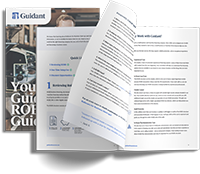As the old saying goes, all good things must come to an end. Whether it’s because you’re looking to sell your business and spend your golden years relaxing in a hammock on the beach or you’re an eager entrepreneur who is ready for your next challenge; to sell your business you’ll need to start by deciding if you should get an estimated small business valuation or a small business appraisal.
These different valuation methods determine the value of your business, which lets you work out the best asking price for selling. After all, you don’t want to list too high and deter buyer interest, but you don’t want to sell too low and not make the money you deserve. Let’s dig a bit deeper to understand why estimated valuations and business appraisals are important and look at the methods to getting one done.
How are Small Businesses Valued?
Estimated business valuations and business appraisals are the two main ways to value your business for sale before you exit the building. They are slightly different however, as you’ll see below. Knowing which one is right for your situation can be a critical step in the process. As with anything you research, there are pros and cons to each. Business appraisals, for instance, are the benchmark when it comes to assigning value, and are often used in legal situations involving divorce, tax problems, bankruptcy, and more. With a business appraisal, sometimes you’ll have a professional visit your location to ensure your physical assets match your written statements.
On the other hand, estimated business valuations are another method of putting a price tag on the value of your business. These estimated valuations are based on the financials you provide and are generally less rigid. The process to complete the report is also usually much quicker than that of an appraisal, so you’ll get your information sooner.
How Much Does it Cost to Get a Business Appraised?
As you can likely guess, business appraisals are more expensive due to their more comprehensive nature, ability to be used in certain legal proceedings, and the use of a professional that may physically come to your location. Business appraisals often start at $5,000 and go up from there. Understandably, this may be too expensive for some small business owners.
Typically you pay less with estimated business valuations: valuations generally start around $1,000 and may be even less. Whereas business appraisals can be used in any situation, however, estimated business valuations can’t be used for legal purposes. However, this is an excellent valuation method to use as a starting place when you’re first deciding on an asking price for your small business.
Learn more about Seller Suite, everything you need to price and sell your business.
Top Reasons to Invest in an Estimated Valuation or Appraisal
You may be wondering why you would even need to embark on the estimated business valuation or business appraisal process before you pick your purchase price. After all, don’t you know your business best? In reality, some selling situations are more complicated than others. It’s best to know your options and arm yourself with all the information to make your best decision. The business and legal reasons are numerous and personal and include:
- You’ve received an acquisition offer.
- You need to resolve disputes related to estate and gift taxation.
- You’re involved in divorce litigation. (Note: Legal situations generally require appraisals by certified professionals)
- You have partners in the business and need to allocate a business purchase price among assets.
- You want to establish a formula for estimating the value of the partners’ ownership interests for buy-sell agreements.
- Your shareholders are in deadlock.
- You are in an estate contest.
Estimated Business Valuation Methods
If you’re starting to think a small business valuation or appraisal may be right for you, you’ll also want to examine how they are done. Be ready to provide information on your income such as revenue and non-cash expenses; assets such as cash, accounts receivable and inventory costs; liabilities such as bank loans and pensions; and data about your business growth, which includes your projected revenue and a summary of why you are selling.
For an estimated business valuation, you will need to provide the financial data, often for at least the previous two years and a forecast for the current year. Quality estimated business valuations should include multiple approaches and methods as a part of the analysis.
Multiple analyses provide a more complete picture of your company’s value. Depending on the information you provide or the nature of your business, one approach in an estimated business valuation may make more sense than the others.
- Asset Approach. This method calculates the difference between your assets and liabilities.
- Discounted Cash Flow Method. This technique uses your three-year forecast to determine future cash flow. A discounted rate is then applied to that future figure.
- Capitalization of Earnings Method. Here professionals use income projections again, but don’t discount the rate. Instead, the capitalization rate is used.
- Market Approach. The market approach analyzes similar companies to yours to assign your value.
- EBITA (Earnings Before Interest, Tax, and Amortization). The EBITA approach uses a number termed the “value ceiling.”
Valuations and Appraisals: Will the Price be Right?
After the research is done and the figures are punched into the equation, there are still a few other variables to add in, from market value to industry trends. You’ll want to assess what’s going on in the industry and your particular vertical, as well.
Keep in mind the valuation and appraisal shouldn’t be used exactly as it’s given to you. You can now take that information and use it to make your decision. The best part? You will have data to back up your decision and won’t second-guess yourself.
To learn more about selling your business, check out The Complete Guide to How to Sell Your Business.

















